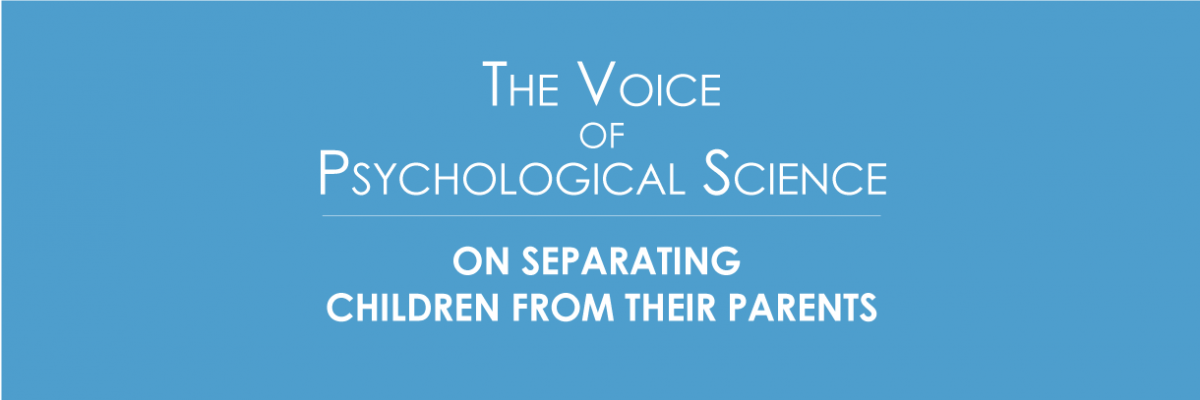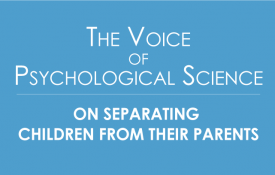In news stories and opinion pieces, psychological scientists are sharing evidence-based insight from decades of research demonstrating the harmful effects of separating parents and children.
In an op-ed in USA Today, Roberta Michnick Golinkoff (University of Delaware), Mary Dozier (University of Delaware), and Kathy Hirsh-Pasek (Temple University) write:
“Years of research are clear: Children need their parents to feel secure in the world, to explore and learn, and to grow strong emotionally.”
In a Washington Post op-ed, James Coan (University of Virginia) says:
“As a clinical psychologist and neuroscientist at the University of Virginia, I study how the brain transforms social connection into better mental and physical health. My research suggests that maintaining close ties to trusted loved ones is a vital buffer against the external stressors we all face. But not being an expert on how this affects children, I recently invited five internationally recognized developmental scientists to chat with me about the matter on a science podcast I host. As we discussed the border policy’s effect on the children ensnared by it, even I was surprised to learn just how damaging it is likely to be.”
Mia Smith-Bynum (University of Maryland) is quoted in The Cut:
Forceful separation is particularly damaging, explains clinical psychologist Mia Smith-Bynum, a professor of family science at the University of Maryland, when parents feel there’s nothing in their power that can be done to get their child back.
In a perspective piece published in the Washington Post, Jaana Juvonen and Jennifer Silvers (University of California, Los Angeles) write:
“The science leads to the conclusion that the deprivation of caregiving produces a form of extreme suffering in children. Separating migrant children from parents, then, increases the likelihood that their experience in immigration detention will cause lasting mental and possibly physical health problems.”
A BuzzFeed story features insight from Megan Gunnar (University of Minnesota):
“While not all of the children we are ripping from their parents will suffer the full consequences of toxic stress, many may,” child psychologist Megan Gunnar of the University of Minnesota told BuzzFeed News.
In the New York Times, Mary Dozier (University of Delaware) discusses her research-based experiences:
For all the dislocation, strangeness and pain of being separated forcibly from parents, many children can and do recover, said Mary Dozier, a professor of child development at the University of Delaware. “Not all of them — some kids never recover,” Dr. Dozier said. “But I’ve been amazed at how well kids can do after institutionalization if they’re able to have responsive and nurturing care afterward.”
Antonio Puente (University of North Carolina, Wilmington) adds his perspective in TIME:
The effects of that harm may evolve over time, says Antonio Puente, a professor of psychology at the University of North Carolina, Wilmington who specializes in cultural neuropsychology. What may begin as acute emotional distress could reemerge later in life as PTSD, behavioral issues and other signs of lasting neuropsychological damage, he says.
A Q&A published in the Los Angeles Times features insight from Nim Tottenham (Columbia University):
“A parent is really in many ways an extension of the child’s biology as that child is developing,” Tottenham said. “That adult who’s routinely been there provides this enormous stress-buffering effect on a child’s brain at a time when we haven’t yet developed that for ourselves. They’re really one organism, in a way.” When the reliable buffering and guidance of a parent is suddenly withdrawn, the riot of learning that molds and shapes the brain can be short-circuited, she said.
In a story from the BBC, Jack Shonkoff (Harvard University) discusses evidence related to long-term impacts:
Jack P Shonkoff, director of the Harvard University Center on the Developing Child, says it is incorrect to assume that some of the youngest children removed from their parents’ care will be too young to remember and therefore relatively unharmed. “When that stress system stays activated for a significant period of time, it can have a wear and tear effect biologically. The younger you are, the more serious the threat.”
Amy van Schagen (California State University, San Bernardino) lends her expertise to a story in Teen Vogue:
“Being separated from their parents or having inconsistent living conditions for long periods of time can create changes in thoughts and behavior patterns, and an increase in challenging behavior and stress-related physical symptoms,” such as sleep difficulty, nightmares, flashbacks, crying, and yelling.
A story in the Wall Street Journal adds the scientific perspective of Carola Suárez-Orozco:
Carola Suárez-Orozco, a professor of human development and psychology at the University of California, Los Angeles who has studied migrants throughout her career, pointed out that children often lack the cognitive abilities to make sense of their surroundings. After extended separation from caregivers, their longer-term outcomes include increased risk of withdrawal, depression, anxiety, crime and anger, she said.
You can learn more about the long-term effects of stress and trauma in early childhood in this research topic on childhood adversity.





Comments
Helpful article. This should be intuitive to us. It helps to have a reminder from current research which backs up what is needed.
There’s no doubt that separating children from their parents harm tge children and their parents.
EFFECTS OF SEPARATION ON YOUNG CHILDREN: IMPLICATIONS FOR FAMILY COURT DECISION MAKING
by Peter Ernest Haiman, Ph.D.
Often I have served as an expert witness for parents in family court. Recently, I watched helplessly as the court made a decision I knew would exacerbate, if not cause, child abuse and additional trauma to a two-year-old child. The mother was the primary caregiver, and it was to the mother that the child turned for comfort when in distress. The father was emotionally unstable, which he took out on his wife and daughter. Yet the judge supported placing the girl with her father on a trip to Canada for four weeks. This was much too long a separation from the primary caregiver. Yet the mother’s attorney did not object. Nor did this attorney advocate in court for an expert witness to provide information about attachment research and the effects of visitation schedules on young children, as the mother had requested. This attorney never took the side of the child or showed empathy for her. This attorney and the opposing attorney spoke in private with each other for some time before the hearing began, and during the hearing they focused only on the needs of the parents.
This problem is not new. For decades, judges, attorneys, and even mediators have been making decisions that result in the ill-advised separation of very young children from their parents or other primary caregivers. Usually these decisions are based solely on the needs of the adults involved. Not enough consideration is given to the short- and long-term impact this separation will have on the child. Yet decisions made by courts can have a wide range of deleterious effects. Research has demonstrated that when young infants and toddlers are kept from developing a secure attachment to a primary caregiver, these children can experience this as traumatic. Some children develop a stutter; others have learning problems. These effects can continue throughout the life cycle (Graham, Heim, Goodman, Miller, & Nemeroff, 1999). Adolescents can have problems with authority, delinquency, attention deficits, shyness, and depression, among other issues. When they become adults, these individuals can present a variety of problems that interfere with their ability to maintain stable and enduring love and work relationships.
In this brief article, we are going to look at some relevant research from the child development literature, and at the effects of separation from the point of view of the infant, toddler, and preschool child. It is at this stage of life that the root of the problem lies.
http://www.peterhaiman.com/articles/effectsOfSeparationOnYoungChildren.shtml
This is exactly what is happening in “Family” Courts everyday. Social workers and psychologists working with psychiatrists and judges and city solicitors have created and sustain this putrid system. A tipping point is about to be reached and the guilty will be held to account for their nefarious self serving activity.
APS regularly opens certain online articles for discussion on our website. Effective February 2021, you must be a logged-in APS member to post comments. By posting a comment, you agree to our Community Guidelines and the display of your profile information, including your name and affiliation. Any opinions, findings, conclusions, or recommendations present in article comments are those of the writers and do not necessarily reflect the views of APS or the article’s author. For more information, please see our Community Guidelines.
Please login with your APS account to comment.